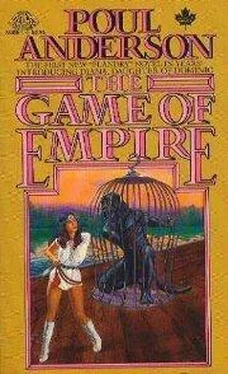Poul Anderson - The Game of Empire
Здесь есть возможность читать онлайн «Poul Anderson - The Game of Empire» весь текст электронной книги совершенно бесплатно (целиком полную версию без сокращений). В некоторых случаях можно слушать аудио, скачать через торрент в формате fb2 и присутствует краткое содержание. Год выпуска: 1985, ISBN: 1985, Издательство: Baen Books, Жанр: Космическая фантастика, на английском языке. Описание произведения, (предисловие) а так же отзывы посетителей доступны на портале библиотеки ЛибКат.
- Название:The Game of Empire
- Автор:
- Издательство:Baen Books
- Жанр:
- Год:1985
- ISBN:978-0-671-55959-5
- Рейтинг книги:4 / 5. Голосов: 1
-
Избранное:Добавить в избранное
- Отзывы:
-
Ваша оценка:
- 80
- 1
- 2
- 3
- 4
- 5
The Game of Empire: краткое содержание, описание и аннотация
Предлагаем к чтению аннотацию, описание, краткое содержание или предисловие (зависит от того, что написал сам автор книги «The Game of Empire»). Если вы не нашли необходимую информацию о книге — напишите в комментариях, мы постараемся отыскать её.
The Game of Empire — читать онлайн бесплатно полную книгу (весь текст) целиком
Ниже представлен текст книги, разбитый по страницам. Система сохранения места последней прочитанной страницы, позволяет с удобством читать онлайн бесплатно книгу «The Game of Empire», без необходимости каждый раз заново искать на чём Вы остановились. Поставьте закладку, и сможете в любой момент перейти на страницу, на которой закончили чтение.
Интервал:
Закладка:
The second face of war is different for every individual. Consider Ensign Helen Kittredge. We pick her name at random out of personnel data. These say little more about her than that she was twenty Terran years of age, born and raised amidst the starknesses of the planet Vixen, winning appointment to the Foundry, doing well as a cadet, newly commissioned and assigned to energy weapons control aboard the light battleship Zeta Sagitarii. That ship was in the detachment of Captain Fatima bint Suleiman, operating out of an asteroid belt in the lifeless system of a nameless sun. Bint Suleiman was among those who voluntarily sought out Magnusson. We may assume that Kittredge was of high heart and cheered the move. Besides idealism, she must have remembered that promotions were bound to become rapid.
Except for Patricius and a few other key stars, Magnusson made no effort to leave his sector defended. Instead he took the initiative, spearing straight on into the inner Empire. One might suppose that this invited the opposition to cut his lines of supply and communication. Actually, interstellar space is too incomprehensibly vast. Traffic need just move by slightly circuitous routes, varied from trip to trip, to be safe from detection and interception by any except the wildest unlikelihood.
Nor did Magnusson keep his fleet together for long. Grown large, it was still smaller by a seemingly appalling factor than the might which the Imperium could have massed against him. Nevertheless he divided it in five. Four, under trusted admirals, swung north and south and clockwise and counterclockwise, essentially running interference for him. The main part, himself in charge, drove directly toward Sector Aldebaran. Zeta Sagittarii was along, trailing his flagship, the superdreadnaught N. Aquilae.
This likewise represented sound thinking. The fact was that the Imperium could not bring more than a fraction of its forces to bear. The rest must keep stations whatever happened, lest barbarians, bandits, and separate insurrections wreak such havoc that nothing would remain to rule over. There was also dread of what the Merseians might do. Furthermore, it is virtually impossible to compel battle in space. He who does not want to fight can run away. Beyond a light-year’s distance, his hyperdrive vibrations are undetectable.
Hence Magnusson could apply great strength wherever he chose, at least in the outer sectors of the Empire. The regions around Sol, more populous and heavily guarded, he must avoid until he had organized sufficient power to invade them. He set about doing this.
It might appear he was overextending himself, and that if nothing else, the Gerhart faction could destroy him by attrition. He had reasons to expect that his advance would be too swift and decisive for that. However, he did go through the initial stages of his campaign in a straightforward manner.
Superficially, the procedure was simple. The five insurgent fleets went to planetary systems which were important because of location, population, industries, resources, or whatever the consideration might be. Each fleet swept aside any garrison vessels, which it always outnumbered and outgunned. Thereupon a world lay under threat of nuclear bombardment from on high. Even it it had ground defenses, the cost of using them looked prohibitive. Besides … well, did it matter that much who was Emperor? What had Gerhart done that beings, cities, continents should die for him? The martial law which Magnusson’s people imposed scarcely touched civilians in their daily lives. They themselves promised glory and better times. Oftener than not, they were born on the planet in question, quietly recruited in advance.
Discipline was strict among the Olafists. Incorrect behavior brought punishment quick, condign, and public. This helped ingratiate them with local inhabitants. Moreover, they were apt to be young, friendly, eager, with stories to tell that put sparkle into dull provincial existences.
We can imagine Ensign Helen Kittredge on leave—let us say, on Ansa, which is like an idyll of Terra. Moonlight in a warm night shimmers across a lake; music sounds from a pavilion, but she and a young man of the planet have left its dance floor and wandered out along the water, under trees which breathe fragrance into the air. Earlier she lectured him earnestly on the new day that Emperor Olaf will bring, but now she has been swaying laughterful in his arms, and they sit down on soft turf, and perhaps she says yes, when the war is over she will take a long liberty here, but that time may be far off and meanwhile the night is theirs …
Leaves were brief, because a fleet must go on to the next sun and the next. One may ask why the Gerhartists did not come in as soon as their foes had left and reclaim every conquest. The answer is multiplex. Such attempts would have been expensive, both to the Navy and to the worlds: for the Olafist detachments occupying them, though small, were busily enhancing defenses, and sure to fight while hope remained. Then too, the Imperium was in disarray, taken by surprise, its high command striving to make sense out of reports that came in late and garbled. Also, the idea was quite sensible that recapturing a few globes would be of scant use while Magnusson’s wolf packs were on the prowl. Better to kill those first. Then the rebels left behind would have no choice but to surrender, especially if amnesty was offered their rank and file.
Therefore, slowly, often chaotically, the regular Navy marshalled what forces it could spare and went in search of combat.
The first major engagement occurred near a dim red dwarf star which had, then, merely a catalogue number, but which afterward was known to spacefarers as Battle Sun. Scout-craft on both sides had been casting about, probing, peering, feeding into computers whatever scraps of data they could glean, dashing back to report. Gradually the pictures emerged, and the masters came to their decisions. They would fight.
Rear Admiral Richard Blenkiron, director of operations for Sector Aldebaran, personally led his armada. He was no coward. Terran-born, he was, besides, a man of considerable wit and charm. Unfortunately, he was not well suited to his position, being a political appointee serving out this assignment in preparation for something less martial and more lucrative. Nobody had foreseen war would reach these parts, as far inward as they lay.
Magnusson had anticipated that, and bypassed several occasions of combat. In two-dimensional terms, it can be said that he made an end run. If he could scatter the Aldebaranian fleet, hostiles at his back would hardly matter. They could be taken care of piecemeal. Meanwhile terror on Terra would be his ally. Therefore he too went looking for battle.
“Now hear this,” intones the intercom system of Zeta Sagitarii. A recording of Sir Olaf’s message to his crews follows. He expects that all will do their duty, and win a victory never to be forgotten. Surely Ensign Kittredge joins in the customary cheers. Thereafter, coolly above a hammering heart, she takes her station.
Since both leaders wanted to meet, they advertised themselves on the way, traveling in dispersed formation to maximize the sphere of detectability. Upon making contact, they deployed according to their respective plans. The gap closed rapidly.
Interstellar war bears no more resemblance to interplanetary than the latter does to planetside combat. Shuttling in and out of quantum multi-space at thousands or even millions of times a second, a ship under hyperdrive is essentially untouchable by an ordinary weapon. A concentrated energy beam or material barrage just might happen to intercept often enough to do significant damage, but the odds against that are huge, and in any event a warcraft has her protections, armor plate, absorbers, computer-controlled negafields to repel incoming matter. Only when the drives of two vessels are in phase do they become solid, vulnerable, to each other.
Читать дальшеИнтервал:
Закладка:
Похожие книги на «The Game of Empire»
Представляем Вашему вниманию похожие книги на «The Game of Empire» списком для выбора. Мы отобрали схожую по названию и смыслу литературу в надежде предоставить читателям больше вариантов отыскать новые, интересные, ещё непрочитанные произведения.
Обсуждение, отзывы о книге «The Game of Empire» и просто собственные мнения читателей. Оставьте ваши комментарии, напишите, что Вы думаете о произведении, его смысле или главных героях. Укажите что конкретно понравилось, а что нет, и почему Вы так считаете.











